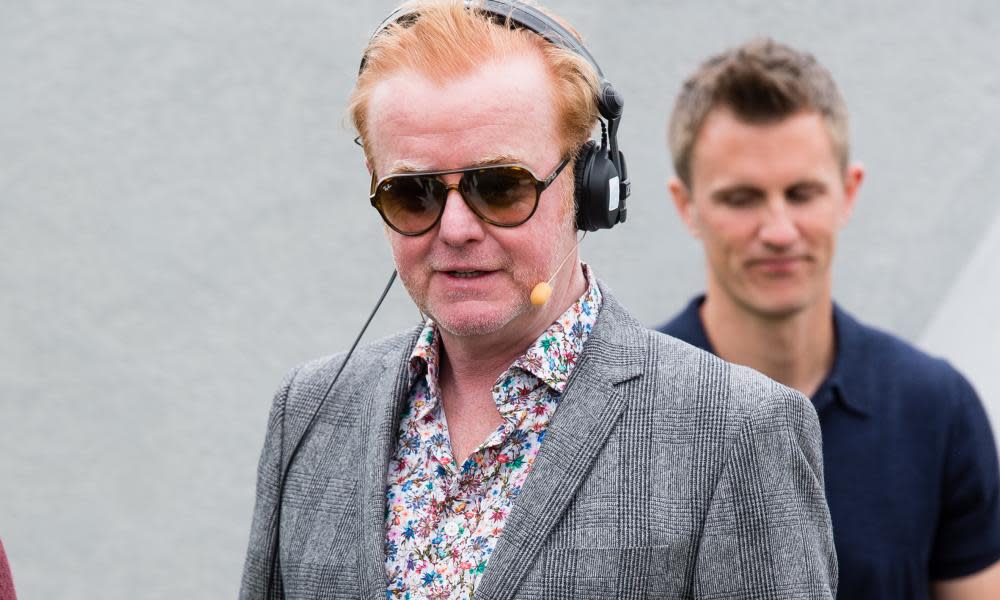Revealed: how hundreds of BBC employees earn 1% of Chris Evans’s wages

Four hundred BBC employees earn less than a hundredth of what the corporation pays its biggest star, it can be revealed.
The corporation confirmed the shock figure to the broadcasting union, Bectu, last week, at the height of the furore over how much some of the BBC’s top stars were earning.
Last week’s now notorious pay list revealed that 96 stars on talent contracts earned above £150,000. More than two-thirds of them were men. The yawning gap between the highest and lowest-paid employees at the BBC has prompted another, less publicised internal row at the corporation.
In an email to Bectu, a BBC representative said: “The actual number of UK employees grades 2-11 who are paid under £20k is 400.” Some employees earning under £20,000 were on less than £16,000, according to the Bectu general secretary, Gerry Morrissey.
The lowest-paid BBC employees will include runners and production assistants. “These people are earning anything between £15,000 and £18,000 to £19,000,” Morrissey said. “We are talking about people who help make content who are in the same department that is commissioning the talent. The BBC is getting £4bn of licence fee payers’ money and it should at least commit to a liveable wage. We think £20,000 is not extortionate.”
A trainee McDonald’s manager earns between £22,000 and £25,000.
Figures published last week by the BBC revealed that Chris Evans earned more than £2.2m. Gary Lineker was paid more than £1.75m. The highest-paid woman, Claudia Winkleman, received more than £450,000.
A BBC spokesman said it was working hard to close the pay gap between the highest and lowest-paid employees. “The gap between the director-general’s earnings and those of the average employee has fallen every year for the past six years. We’re committed to supporting the lowest earners and, while we’ve cut our pay bill for talent and senior managers, we’re currently consulting on changes to terms and conditions, which will include raising the lowest salary at the BBC by more than £3,000.”
The corporation was forced to publish the salaries of its top creative talent by the government, which demanded more transparency on pay. But the exercise has been criticised for raising more questions than it answered.
Those paid by BBC Worldwide, its commercial arm, are not included. And from next year those paid by BBC Studios, its production arm, will also be exempt. In addition, BBC stars do not have to declare their salaries paid by private production companies. For example, BBC Question Time presenter, David Dimbleby, is paid by a production company, Mentorn, so did not appear in last week’s disclosures.
After the publication of what it pays its top talent, former Top Gear presenter and Radio 2 DJ Evans was thought to be the highest-paid BBC star. But, while the corporation confirmed that Graham Norton was paid more than £850,000 from the licence fee, this was not the full picture.
Scrutiny of the accounts of So Television, a production company co-founded by Graham Norton which makes the BBC’s Graham Norton Show, reveals that it also paid the chatshow host more than £2.6m last year.
There have been calls from Tory MPs for private production companies to reveal what they are paying BBC stars. But this idea was condemned by John McVay, chief executive of Pact, which represents independent production companies.
“The government doesn’t require that people who work in advertising agencies on campaigns for the government declare what they get paid. If you want to apply this principle to the BBC, you should apply it to all commercial companies that do work for the public sector.”
Media analyst Claire Enders said the BBC was doing more than most media organisations to address the pay gap, but it was battling demographics.
“This country has only been making efforts on diversity for a certain amount of time. The longer you’ve worked, the bigger the pay gap you experience in the UK, because you went into the workforce when these concepts were unknown. John Humphrys is 73 and has been at it a long time.”
Revelations of what their male colleagues are paid has prompted fury among some female presenters. Newsnight presenter Emily Maitlis is one employee said to be considering her position after learning what other presenters of Newsnight are earning. She joked to a technology conference last week: “You’re doing so well, soon you’ll be able to afford a BBC man.”
Significantly, however, the amount that the BBC’s male and female stars demand on the open market for hosting conferences and giving speeches is remarkably similar, suggesting transparency does help level the playing field.
According to the website of talent booking agency JLA, Maitlis charges a fee of between £5,000 and £10,000 – the same as Jeremy Vine and Humphrys. Winkleman and Fiona Bruce command between £10,000 and £25,000, the same as Huw Edwards.

 Yahoo News
Yahoo News 
